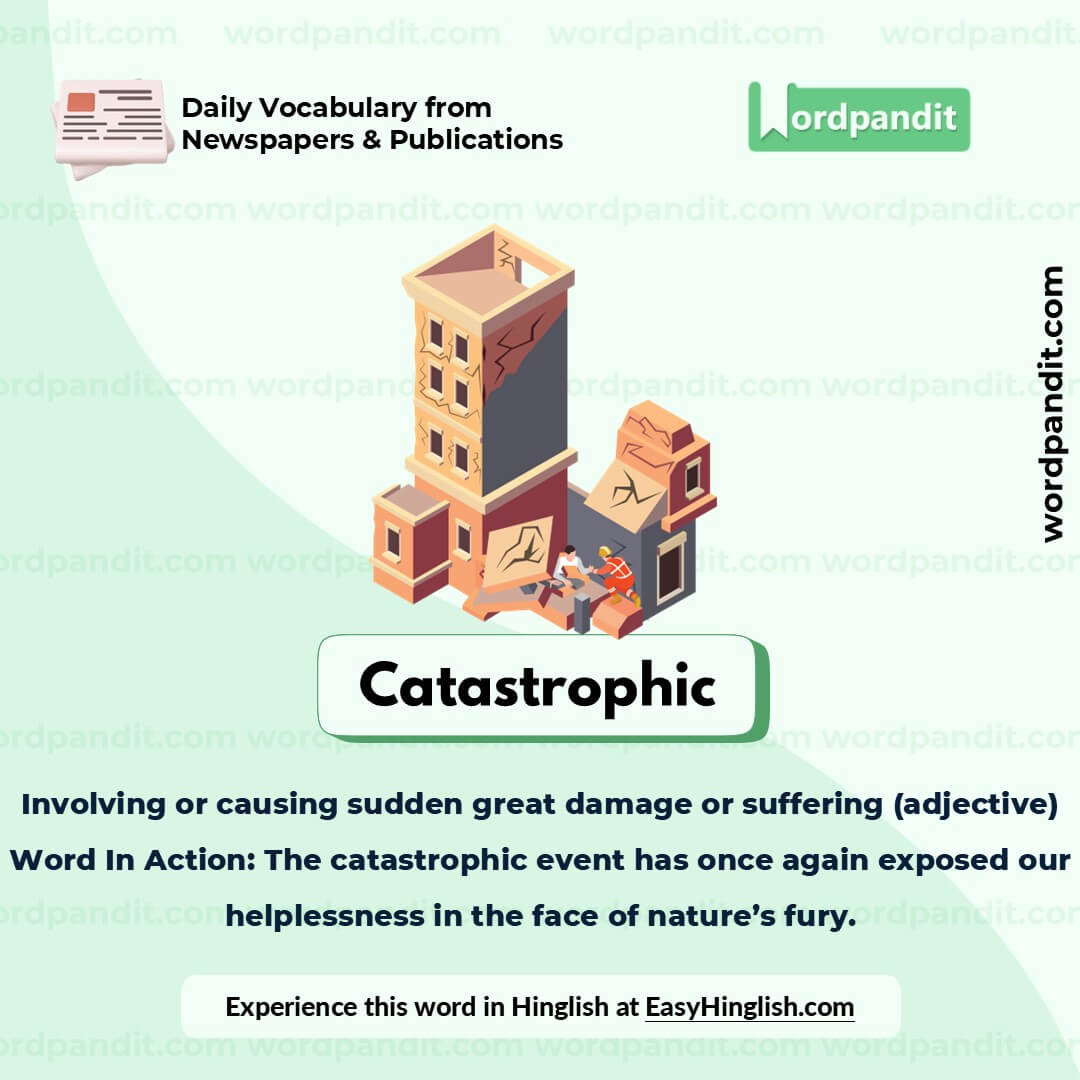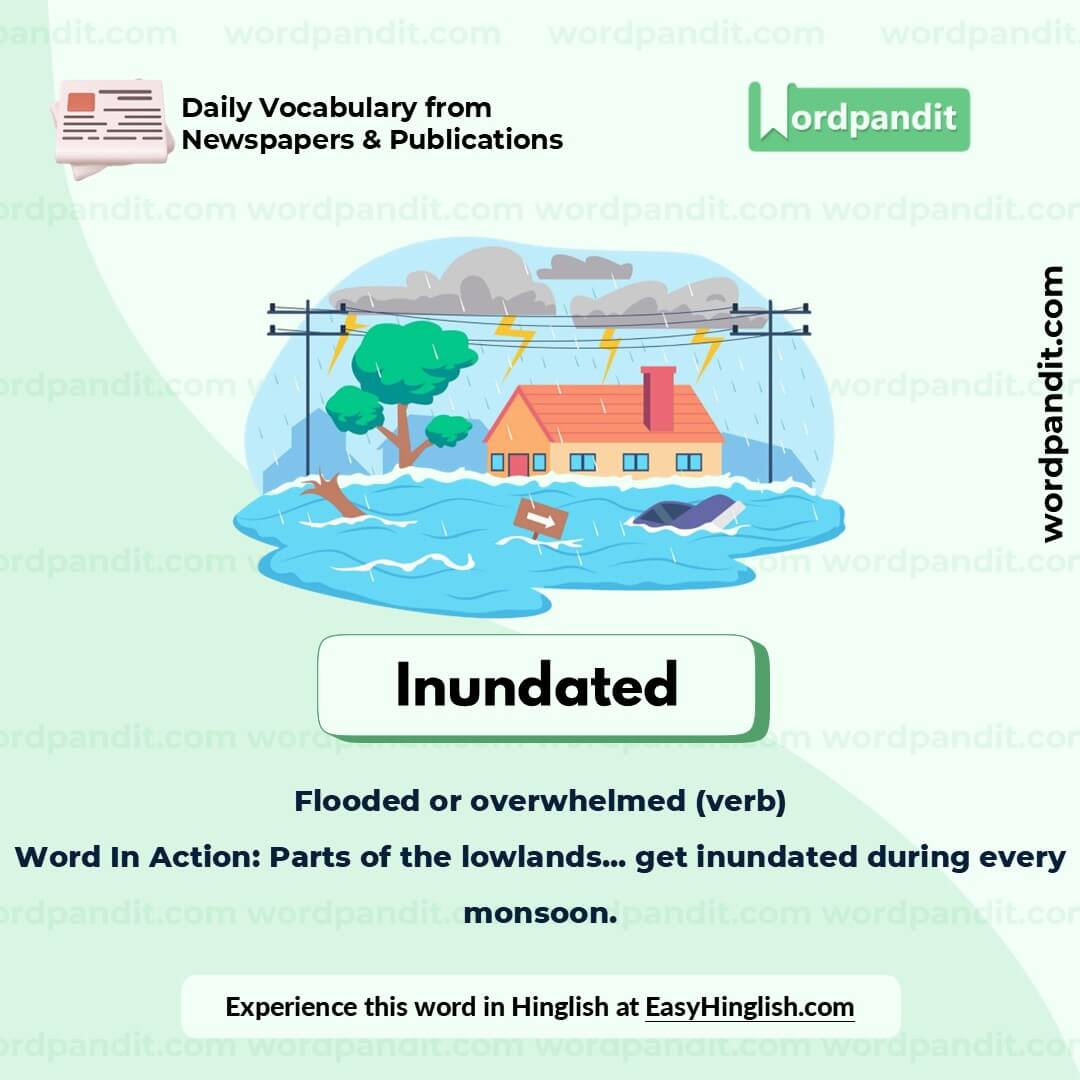Daily Vocabulary from Indian Newspapers and Publications
Welcome to Wordpandit’s Indian Vocabulary Hub
At Wordpandit, we understand the importance of staying rooted in the local context while expanding your language skills. This section focuses on enriching your vocabulary with words and phrases drawn from India’s leading newspapers and publications, ensuring you're learning vocabulary that is practical, relevant, and uniquely Indian.
Why Indian Sources Matter
We believe that the best way to master any language is by immersing yourself in local content. That’s why we carefully curate vocabulary from top Indian publications, including:
- The Hindu
- The Times of India
- The Economic Times
- Hindustan Times
- Live Mint
- The Indian Express
- And many others...
Stay Updated, Stay Relevant
With daily updates from Indian news sources, you’ll be consistently learning words that reflect the trends and shifts in Indian society and culture. Our focus is to provide vocabulary that enhances your understanding of the language in an Indian context.
How Wordpandit Supports Your Goals
Whether you’re preparing for exams, aiming to improve your professional communication, or simply want to stay connected with the latest Indian vocabulary, Wordpandit is here to guide you every step of the way.
Learn with a Practical Approach
Our interactive learning methodology includes real-world examples, engaging activities, and context-specific usage to ensure that every word becomes part of your active vocabulary.
Dive into Indian Vocabulary Today!
Why Choose Wordpandit?
Practical Learning: Focus on words you'll actually encounter in real-world reading, enhancing your comprehension and communication skills.
Diverse Content: From current affairs to scientific breakthroughs, our varied sources expose you to vocabulary across multiple domains.
Effortless Integration: Make Wordpandit a part of your daily routine. Just a few minutes each day can significantly boost your lexicon over time.
Your Path to Vocabulary Mastery
- Visit our Daily Vocabulary section regularly
- Explore new words and their usage in context
- Practice incorporating these words into your own writing and speech
- Track your progress as your vocabulary expands
Start Your Journey Today
Embark on your vocabulary enhancement journey with Wordpandit. By consistently engaging with our daily posts, you'll build a robust vocabulary that serves you well in academic, professional, and personal contexts.
Remember, a word a day keeps linguistic limitations at bay. Make Wordpandit your daily companion in the quest for vocabulary excellence!
WORD-1: Multidimensional
Context:
"It is impossible to capture a university’s multidimensional nature with a single metric." - The Hindu
Explanatory Paragraph:
When something is multidimensional, it has many aspects or features that contribute to its overall complexity. For instance, a university isn't just about academics; it also includes culture, research, social life, and more, making it multidimensional.
Meaning: Having multiple aspects or dimensions (adjective)
Pronunciation: muhl-tee-dih-MEN-shuh-nl
Difficulty Level: ⭐⭐⭐ (Intermediate)
Etymology: From the prefix "multi-" meaning many, and "dimension" meaning aspect or measurable extent
Synonyms & Antonyms:
Synonyms: complex, multifaceted, diverse
Antonyms: simple, one-dimensional, straightforward
Usage Examples:
- The city’s multidimensional charm lies in its blend of modernity and tradition.
- The issue requires a multidimensional approach to be fully understood.
Cultural Reference:
"A multidimensional character in literature reflects the complexities of real life." - Literary theory
Think About It:
What other aspects of life or systems are multidimensional but often get reduced to a single measure?
Quick Activity:
List three things in your life that you consider multidimensional. Describe the different dimensions they encompass.
Memory Tip:
Remember "multidimensional" by breaking it down: "multi-" meaning many, and "dimensional" like the different dimensions of a shape.
Real-World Application:
The term "multidimensional" is useful in describing anything that has more than one aspect, whether it's a problem, a person, or an organization.
WORD-2: Catastrophic
Context:
"The catastrophic event has once again exposed our helplessness in the face of nature’s fury." - The Hindu
Explanatory Paragraph:
When something is catastrophic, it causes extreme damage or disaster. It refers to events that are massively destructive and often beyond human control, like natural disasters.
Meaning: Involving or causing sudden great damage or suffering (adjective)
Pronunciation: kat-uh-STROF-ik
Difficulty Level: ⭐⭐⭐ (Intermediate)
Etymology: From Greek katastrophē meaning "overturn, disaster"
Synonyms & Antonyms:
Synonyms: disastrous, calamitous, devastating
Antonyms: fortunate, beneficial, harmless
Usage Examples:
- The earthquake was catastrophic, leaving thousands without homes.
- A catastrophic mistake in the project led to its complete failure.
Cultural Reference:
"The Titanic’s sinking was a catastrophic event that changed maritime safety forever." - History Channel
Think About It:
What are some measures we can take to prevent or mitigate catastrophic events?
Quick Activity:
Think of a historical event that was considered catastrophic. What could have been done to reduce the impact?
Memory Tip:
Remember "catastrophic" by thinking of "catastrophe," a term commonly used to describe natural disasters or large-scale tragedies.
Real-World Application:
The word "catastrophic" is often used in news reports when describing natural disasters, major accidents, or events causing widespread destruction.
WORD-3: Encroachment
Context:
"There are encroachments by the people and for development projects." - The Hindu
Explanatory Paragraph:
Encroachment refers to the gradual takeover of land, rights, or property, often in a way that is illegal or not agreed upon. It can happen when individuals or companies extend their activities beyond what is allowed, such as building on protected land.
Meaning: The act of gradually invading or taking over land, space, or rights (noun)
Pronunciation: en-KROHCH-muhnt
Difficulty Level: ⭐⭐⭐ (Intermediate)
Etymology: From Old French encrochier, meaning "to seize, fasten upon"
Synonyms & Antonyms:
Synonyms: invasion, intrusion, trespass
Antonyms: retreat, withdrawal, yielding
Usage Examples:
- The encroachment of new buildings into the forest is threatening wildlife habitats.
- The government took action to stop the encroachment on public land by private companies.
Cultural Reference:
"Urban encroachment has become a significant issue, with cities expanding into natural environments at an alarming rate." - National Geographic
Think About It:
What are the long-term consequences of encroachment on natural spaces?
Quick Activity:
Identify a local area where encroachment is occurring. How has it affected the community or environment?
Memory Tip:
Think of "encroachment" as slowly "crowding" into a space where you're not supposed to be.
Real-World Application:
"Encroachment" is commonly used in discussions about urbanization, environmental conservation, and property law.
WORD-4: Inundated
Context:
"Parts of the lowlands... get inundated during every monsoon." - The Hindu
Explanatory Paragraph:
To be inundated means to be overwhelmed, often by water, but it can also be used metaphorically to describe being flooded by anything, such as work or requests.
Meaning: Flooded or overwhelmed (verb)
Pronunciation: IN-uhn-dayt-ed
Difficulty Level: ⭐⭐ (Basic)
Etymology: From Latin inundare, meaning "to flood"
Synonyms & Antonyms:
Synonyms: flood, swamp, overwhelm, submerge
Antonyms: drain, clear, dry out
Usage Examples:
- The fields were inundated with rainwater after the heavy storm.
- During the holiday season, the customer service team was inundated with requests.
Cultural Reference:
"Inundation was a common problem in ancient Egypt, as the Nile often flooded, providing fertile soil but also creating challenges for settlements." - History of Ancient Civilizations
Think About It:
How can communities better prepare for areas that are prone to being inundated by natural forces?
Quick Activity:
Describe a time when you felt inundated with work or responsibilities. How did you handle it?
Memory Tip:
Think of "inundated" as being "in a date" with a flood of tasks or problems.
Real-World Application:
The word "inundated" can describe both literal floods of water and metaphorical floods, like a busy inbox or too many responsibilities.
WORD-5: Pervaded
Context:
"The higher education ecosystem is pervaded by a culture of ‘publish or perish." - The Hindu
Explanatory Paragraph:
To pervade means to spread throughout every part of something. If a culture or idea pervades an environment, it influences everything within that space.
Meaning: To spread through or be present throughout (verb)
Pronunciation: pur-VEYD-ed
Difficulty Level: ⭐⭐⭐ (Intermediate)
Etymology: From Latin pervadere, meaning "to go through"
Synonyms & Antonyms:
Synonyms: permeate, fill, saturate
Antonyms: localize, limit, restrict
Usage Examples:
- The smell of fresh coffee pervaded the entire office.
- A sense of optimism pervaded the crowd after the announcement.
Cultural Reference:
"A culture of fear pervaded the workplace, making employees hesitant to voice their concerns." - Business Insider
Think About It:
What are the signs that a particular attitude or culture has pervaded an organization?
Quick Activity:
Think of a belief or habit that pervades your life. How does it shape your actions or decisions?
Memory Tip:
Think of "pervade" as something that "permeates" or spreads everywhere.
Real-World Application:
"Pervaded" is often used to describe atmospheres or conditions that spread across entire systems, cultures, or environments.


















